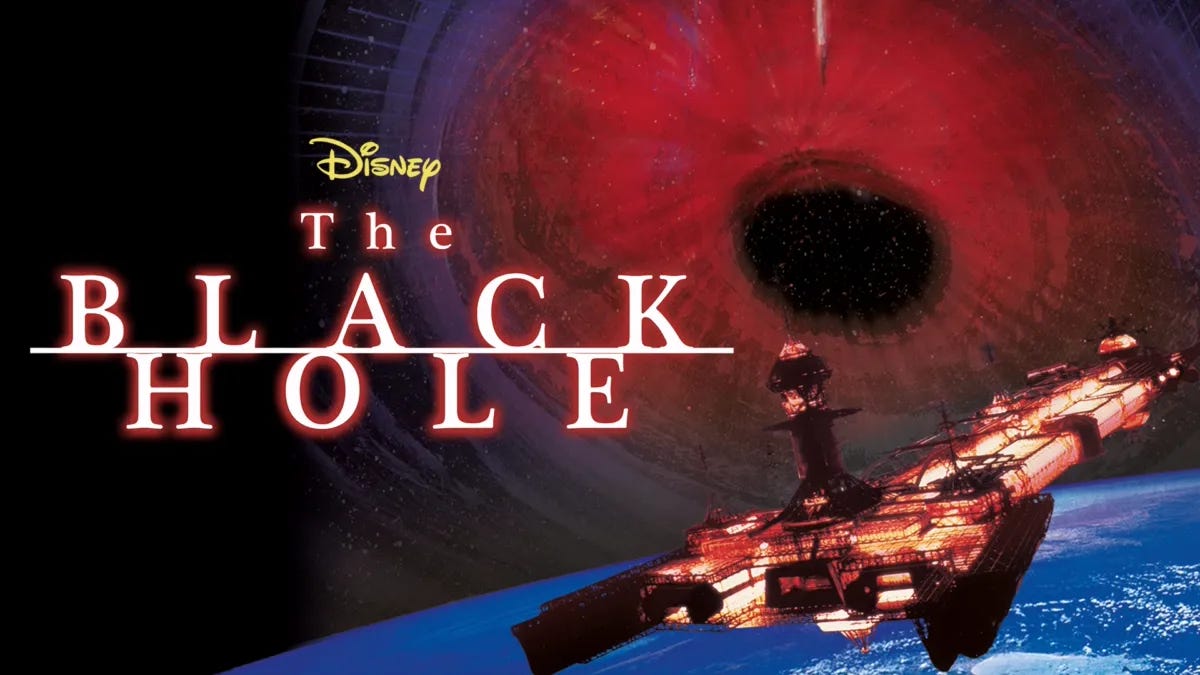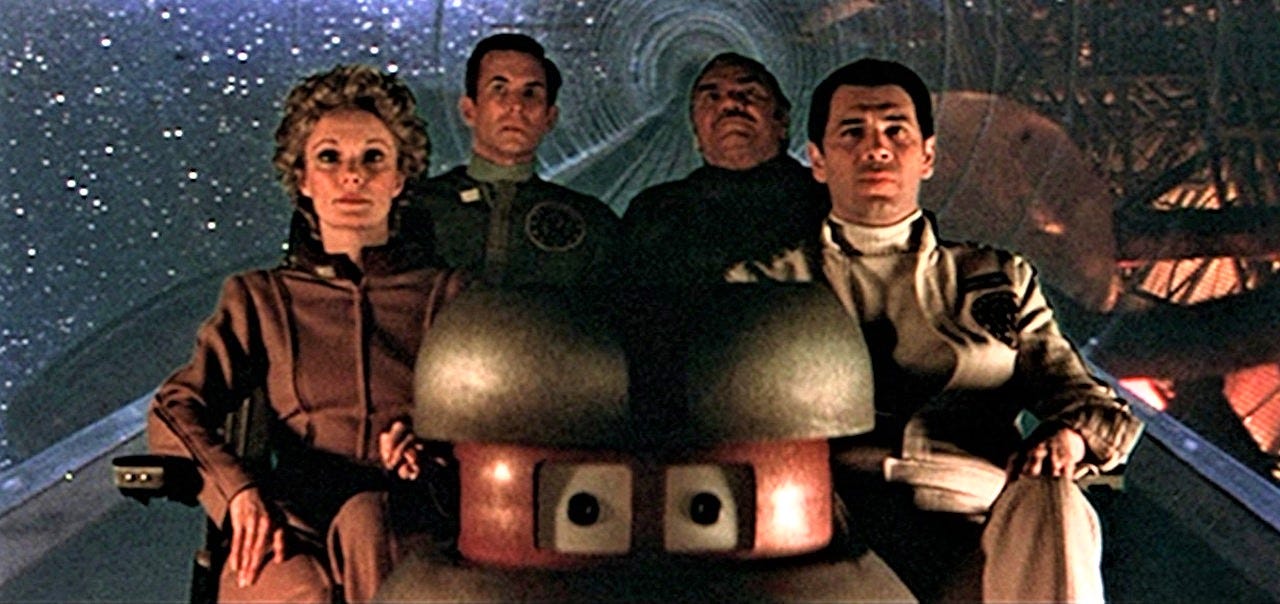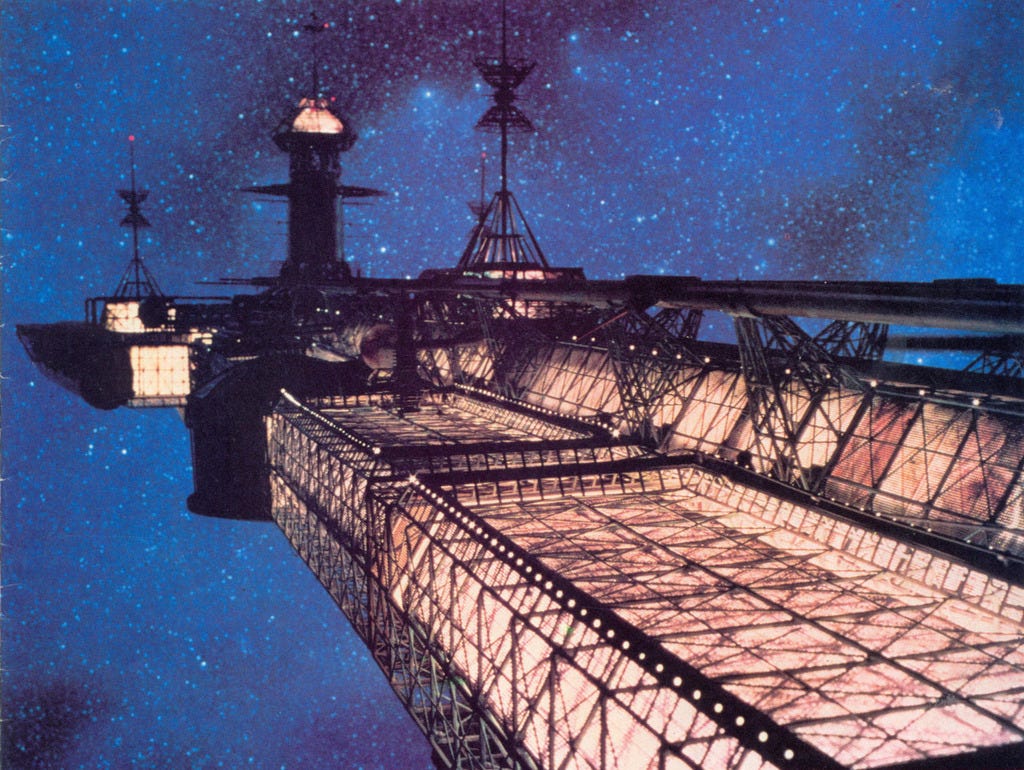Directed by Gary Nelson
United States, 1979
It’s right out of Dante’s Inferno - Harry Booth
A long time ago in a galaxy far, far away … before such things as CGI and VFX we had matte paintings and miniatures. And that’s how we ended up with films like The Black Hole, an inventive mash-up of Forbidden Planet and Joseph Conrad’s novella, Heart of Darkness. Released in 1979 and directed by Gary Nelson, whose CV included the TV series Happy Days and the Jodie Foster body-swap comedy, Freaky Friday, The Black Hole was seen by many as the Walt Disney Studio’s cynical attempt to cash in on the success of Star Wars. It was their first film to garner a Parental Guidance rating and while there are plenty of ‘allusions’ to Star Wars here – a couple of wise-cracking droids, and stormtroopers who actually look and act more like skittles – there is much more going on in The Black Hole than at first meets the eye.
The film opens with a spacecraft, the USS Palomino, on day 547 of a mission to explore the universe in search of extraterrestrials, or as Dr Kate McRae (Yvette Mimieux) puts it: to discover ‘habitable life’. Yes, the script does get as ropey as that.
She is joined aboard the ship by a crew of Hollywood stalwarts: the ever steady Robert Forster as Captain Dan Holland, Anthony Perkins as scientist Dr Alex Durant, and then we have the ships droid V.I.N.CENT (Vital Information Necessary CENTralized – voiced by an uncredited Roddy McDowell), who is not as clunky as that acronym suggests. And for some reason they have brought along Ernest Borgnine, as grumpy old journalist Harry Booth, who spends the whole flight whingeing. I’ve no idea why you would bring along a journalist on a space mission and if I had my way I would have blown him out of the airlock at the first opportunity. But perhaps that explains why I’m not space captain material as he later proves to be a necessary plot device.
Harry can’t believe his luck when the Palomino comes across what he declares will be ‘the biggest story of the century’: a black hole, which for dramatic purposes is displayed as a giant whirlpool in space. And not only that, but they also discover a huge spaceship, the USS Cygnus, that was reported lost in space many years before. Going closer for a better look, they end up almost getting sucked into the black hole, but after a traumatic and turbulent few minutes in which the Palomino starts to break apart they are rescued by the zero gravity field of the Cygnus. In a great reveal, having been dark up to this point, the Cygnus lights up like a Christmas tree – a magnificent illuminated Crystal Palace in space.
The dilapidated industrial space aesthetic. Large space with harsh shadows. Ridley Scottesque - N
The Cygnus has just one surviving crew member, at least that’s what we think: the extravagantly bearded Dr Hans Reinhardt (Maximilian Schell). A blend of Dr Frankenstein and Prospero from Shakespeare’s The Tempest, he is apparently ‘one of the greatest space scientists of all time’. The crew are blind to the flashing warning lights saying: ‘Beware, Mad Scientist!’, as they sit down to a banquet of food and wine grown in his own space garden. They are served by the aforementioned stormtroopers and Dr Reinhardt’s aide-de-camp, a scarlet red, sinister-looking, flying robot named Maximilian.
Dr Reinhardt has managed to use the energy of the black hole not only to power the Cygnus itself, but also to keep the ship right on the edge of the abyss – which ‘one day may devour the universe itself’ – without being drawn in. Captain Holland and the crew are anxious to repair the Palomino in readiness for their return home, but as they do so Reinhardt reveals his master plan. He has calculated the precise route that will allow him to slingshot the Cygnus through the black hole undamaged, propelling the ship into another universe. Will he succeed?
Well, I think you can guess the answer to that question, but The Black Hole is a really entertaining watch. Sure, the script has more holes than a pair of fishnet stockings and some of the 70s design choices look decidedly dated, but the cast throw themselves into the whole enterprise with a gusto that matches the operatic soundtrack, and The Black Hole really is fizzing with ideas.
Dr McRae happens to have an extra-sensory perception connection with their droid, V.I.N.CENT, that is never explained. V.I.N.CENT himself spends most of the film coming out with an irritating stream of witticisms and epigrams, but he’s also the coolest head in the Palomino crew.
A wolf remains a wolf, even if it has not eaten your sheep - V.I.N.CENT
The Cygnus droids entertain themselves by fighting duels in an on-board video arcade while the Palomino crew zoom around what looks like a precursor to Ridley Scott’s Nostromo in a kind of space rollercoaster. I don’t understand why there was never a The Black Hole ride at Disneyland. There is an inevitable David and Goliath showdown between V.I.N.CENT and Maximilian, armed with a chest-full of blender accessories, and that Biblical set-to brings the film to its climax.
The Black Hole is filled with spiritual references: does V.I.N.CENT with his telepathic skills have a soul? And when Captain Holland witnesses some of the robots giving one of their brethren a funeral, the whereabouts of the missing Cygnus crew is finally revealed. This is where the film becomes very strange indeed as the whole enterprise spirals into its own black hole. Reinhardt, after being crushed by giant TV screen (a metaphor for the collapse of the old film studios anyone?), becomes physically united with Maximilian in a demonic hellscape. Standing on a mountain crag underneath a crimson sky and surrounded by a crowd of lost souls slowly trudging toward flames, the last we see of Reinhardt are his petrified eyes peering out of Maximilian’s metal carcass.
As for the surviving crew of the Palomino, after managing to escape in a probe ship, one of the Cygnus’ lifeboats, they dive into the black hole, preceded by a ghostly angel figure. In a mind-bending low-budget re-run of the ending of 2001: A Space Odyssey they finally emerge into a universe with a planet straight ahead of them. Is it Earth, or is it Heaven? I have no idea. But what I do know is that The Black Hole is a film that is greater than the sum of its parts…
A lot of time and lot of effort to make a pretty good movie. Not a great movie. Not some outstanding movie. But a pretty good movie that will, no matter what, probably stick around for a long time - Gary Nelson
When I first saw Stars Wars, I liked it a lot. But The Black Hole? I liked it even more, despite it giving me nightmares. It filled me with an existential dread before I even knew what that meant - S
Reids’ Results (out of 100)
C - 72
T - 63
N - 74
S - 74
Thank you for reading Reids on Film. If you enjoyed this review please share with a friend and do leave a comment.
Coming next…Personal Shopper(2016)









